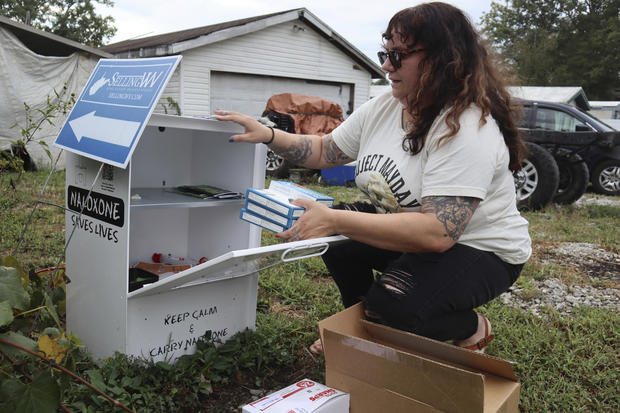
Old newspaper dispensers deliver Narcan opioid overdose reversal drug instead of news
“With one push, you could save a life.” Framingham offers free Narcan training
02:17
Tasha Withrow, a co-founder of harm reduction organization Project Mayday, said Narcan wasn’t something she ever had access to when she was using opioids. A person in recovery, she now helps place boxes of naloxone in a community distribution box, where those in need can obtain the life-saving medication for free.
Naloxone, a nasal spray most commonly known as Narcan, is used as an emergency treatment to reverse drug overdoses. Naloxone distribution containers have been proliferating across the country in the more than a year since the U.S. Food and Drug Administration approved its sale without a prescription.
“People can just reach in and grab what they need — we didn’t have that back then,” Withrow said, while stocking a container in a residential neighborhood of Hurricane, West Virginia, earlier this week. “To actually see that there is some access now — I’m glad that we’ve at least moved forward a little bit in that direction.”
Leah Willingham / AP
Such boxes — appearing in neighborhoods, in front of hospitals, health departments and convenience stores — are one way those supporting people with substance use disorder have sought to make Narcan, which can cost around $50 over the counter, accessible to those who need it most. Not unlike little free libraries that distribute books to anyone who wants one, the metal boxes formerly used as newspaper receptacles aren’t locked and don’t require payment. People can take as much as they think they need.
North Texas musician champions Narcan vending machines to combat opioid overdoses
02:08
Since installing a vending machine Narcan container — which just requires a zip code be entered on the keypad to access the medication — it’s distributed around 2,600 packages a month.
“To say, ‘Hey, we have a 24-hour vending machine, come over here and come get what you need — no judgment,’ is so bold in this Bible belt state and it’s helping me break down the the stigma,” she said.
Kendrick Barnett said there’s no place for judgment when it comes to what she calls live-saving health care: “People are going to use drugs. It’s not our job to condemn or condone it. It’s our job to make sure that they have the necessary health care that they need to survive.”
The Save a Life Day box her organization received is going to go in front of their new clinic, scheduled to open in October.
In Erie, Pennsylvania, 74-year-old stained glass artist Larry Tuite said he grew concerned seeing overdoses increasing in his city. He began leaving Narcan packages on the windowsills of 24-hour markets in town that sell products like pipes and rolling papers. He was shocked at how quickly they disappeared.
“As many as I give out, I run through them really quickly,” said Tuite, who keeps cases of the drugs stacked along the walls of his studio apartment.
The Save a Life Day container, which he got permission to put outside one such store, has helped him to disperse even more Narcan. At least a dozen people have been saved by the medication he’s distributed, he said.
More
More
Source: cbsnews.com